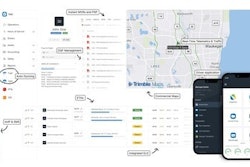
Clean truck rules are heavy on the minds of many in the industry. These mandates are on a quest to lower transportation emissions but many questions around the implementation remain unanswered, with deadlines looming. This year, five states will implement Advanced Clean Trucks, requiring manufacturers to sell increasing percentages of zero-direct-emission trucks through model year 2035. For model year 2025 trucks, 7% of new Class 7-8 truck sales must be zero-emission trucks. In December, 8 trucking associations came together to express concerns over these requirements, asking for a delay in the implementation of these rules.
Kendra Hems, president of the Trucking Association of New York (TANY), says the trucking industry is proud of its decades-long efforts to reduce emissions while meeting America’s growing freight needs. New technologies and growing support offer a promise of further reductions, but the path forward on zero-emissions vehicles requires time for infrastructure to be built.
"Currently, the complete lack of charging infrastructure in New York for medium- and heavy-duty vehicles is a significant hurdle to the adoption of battery electric trucks. In fact, there is not a single, publicly available on-highway charging station built for medium- and heavy-duty vehicles in the entire state," says Hems. "New York is woefully behind the curve on electric infrastructure and is putting vehicle manufacturers and truck dealers in a situation where they simply cannot comply with this mandate. Trucking companies are not going to buy vehicles that they structurally cannot use."
For a trucking company, Hems describes, the lack of charging infrastructure is a major disincentive to purchasing zero emission trucks. Additionally, the cost of an electric truck, as well as their limited range and excessive weight are also significant hurdles that many companies cannot overcome at this time— the range concern is directly tied to the lack of available charging.
When it comes to TANY, the association is fully supportive of shifting the industry to cleaner vehicles but believes it must be done in a commonsense way, taking into consideration the numerous challenges that must be overcome to support their use. For Hems: While all of the bureaucratic discussions are being had, what is lost are the impacts on the hardworking New Yorkers, and New York based businesses that are being brought to their knees.
"DEC must stop the implementation of the ACT rule. Forcing a mandate on an industry before the support for that mandate exists is a no-win situation. We must recognize that you can’t sweep a broad brush toward electrification on an industry that is as diverse as the trucking industry. Rather, we should work together to identify applications, such as last mile and urban delivery, that are ripe for electrification and work on incentives to shift those operations. Only by working together can we bring about immediate change for New Yorkers and pave the way for a greener more sustainable future," says Hems.
As the Trump administration issues ongoing executive orders, relative to these issues comes the EO from President Trump to eliminate the EV mandate, leaving much of this discussion in limbo. Shedding light on the lack of infrastructure to make this an actionable movement should be paramount to support trucking networks in New York and beyond.




















